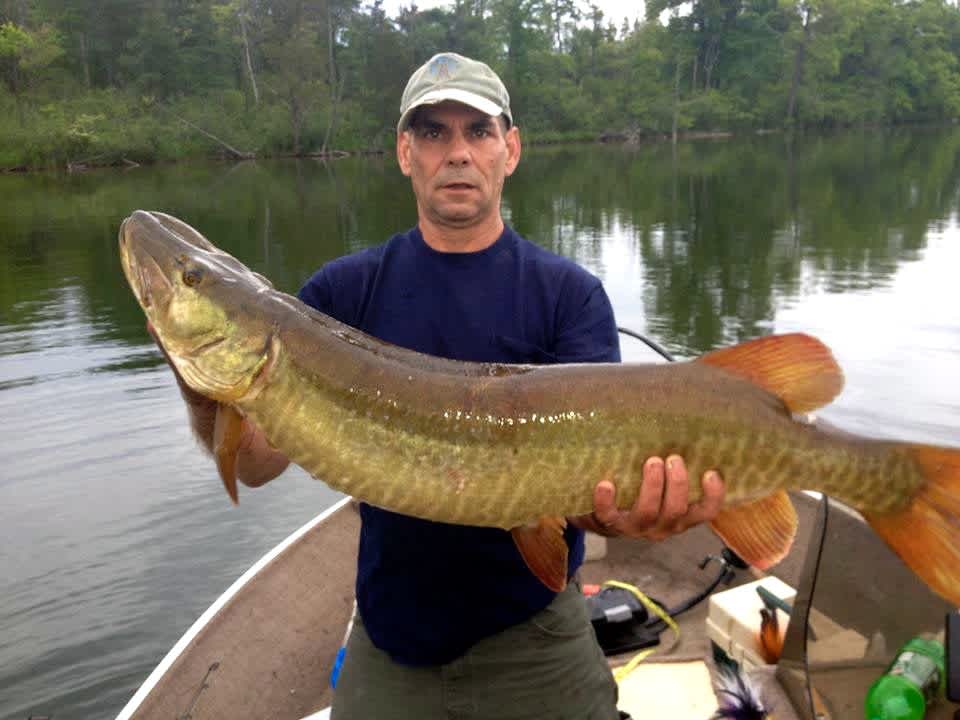Tips and Tricks for Michigan’s Inland Summer Muskies
Dave Mull 07.25.13

Kelly Bennett of Paw Paw, Michigan became enthralled with muskies as a teenager in the mid-1970s when he released a sub-legal northern pike.
“I’d reeled in a hammer handle, and guess what followed it,” he says. “I was wading, skipped the fish in, showed it to my friend on shore and tossed it back into the lake and BALOOSH! A big muskie annihilated it. I’ve fished for nothing else ever since.”
These days the self-employed forester can be found in his 16-foot Smokercraft boat at least twice a week on southwest Michigan lakes where the Michigan Department of Natural Resources has stocked the species. In his last six trips he’s boated five muskies, which he figures is above his average.
“I probably catch fish on 50 percent of my trips,” he says.
He also makes many of his lures with kits from Alumilite.

Bennett offers some insights to catching summertime muskies on Michigan’s natural lakes.
- Give them something they haven’t seen. “Do these fish think? I think they do. They certainly remember. I have a female I put in my pond eight years ago as a 44-incher. I take hooks off of plugs and cast them to her. If it’s new she’s real interested for awhile, but after she’s seen it, she just cruises away even if I cast it at her days later.”
- Go when the weather is bad. “Some lakes look like chopped salad with so many ski boats churning up weeds. Best days on those lakes are rainy or when high winds keep the recreational boats off.”
- Learn to love storms. “Muskies get more active when a storm front is coming in or when there’s a pressure change.”
- Don’t “rot.” “Most times I’ll catch a fish within the first couple of hours on the lake—or at least see some active fish breaching or following my bait. If not, they’re usually just not active that day so might as well go home and come back later. You can stay 12 hours and ‘rot,’ and maybe get a fish in 600 casts, but not usually.”
- Vary the retrieve. “It’s not so much the bait as it is the presentation. Mix it up. Reel fast. Slow. Pause. Twitch.”
- Cast and finesse. “Lot of times I fish a lure slow, almost like if I was fishing for walleyes. Give the lure lots of different action. Like with a bucktail, don’t just cast and burn it back, let it helicopter down on a weed edge, pop it up, reel it slow, give it some different actions. Trolling can’t give a lure the action you can give it when you’re casting.”
- Avoid wire leaders. “I use a 65- to 80-pound fluorocarbon leader, 12 or 13 inches long.”
- Rig heavy. Bennett spools reels with 65-pound test braided TUF-Line. “Not because a fish might break it during the fight, but when a 30-pound fish hits you’ve got to set the hook hard. Don’t want to break off. Sometimes casting eight- to 10-ounce baits weakens the line near the lure and you don’t want to make a cast and have the line break and sail a 35-dollar lure across the lake.”
- Longer is better. “I like a seven-foot, 10-inch to nine-foot rod—eight-foot is my favorite, medium-heavy to heavy action,” says Bennett, who is a fan of St. Croix sticks. “A longer rod lets you set the hook better and avoid getting any slack in your line. When you set the hook, a longer rod moves twice as far as a short rod.”
- Improvise baits. “Take a big bucktail and put a wire leader on the back hook and on the back of that run a smaller bait. A Rapala or a spoon or a little bucktail.”
- Go natural. “I’ve always leaned towards natural colors that represent a bass or bluegill or perch. If a lake has redhorse suckers or carp that’s what I like lures to look like.”
- Occasionally downsize. “Everyone is hung up on giant baits. But an elephant will cross the road to get a peanut.”
- Break the structure habit. “They’re not always hung up on structure. Muskies, even in 80-degree temps, those girls can be right under the surface. Lots of fish can be in 40 feet of water, out in the middle, just three feet below the surface.”
- Leave big fish—but come back. “If I bring a big fish up to the boat (behind a lure) and he’s not receptive, I don’t bother that fish. I put a marker buoy down and I come back and throw a different bait.”
Bennett also offered some advice on releasing fish in hot weather.
“You’ve go to be real ginger with them this time of year,” he says. “Don’t even pull it out of the water, or if you do, after you unhook it in the net, get a quick picture and release. Guys kill them by taking too many pictures.”
To see a list of Michigan’s best lakes for muskies, click here.
For more information on Michigan fishing go to michigan.org. Click here to purchase a Michigan fishing license online.

